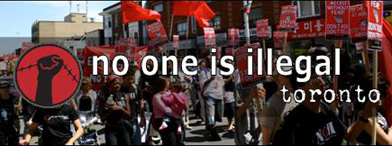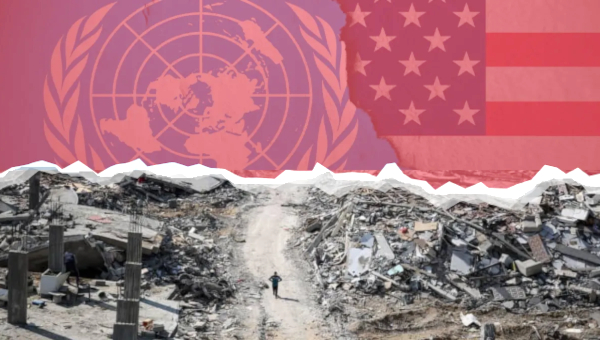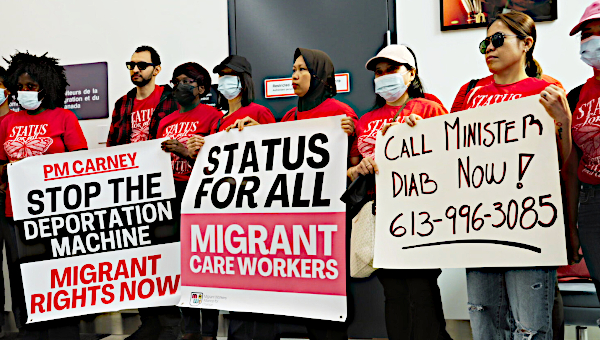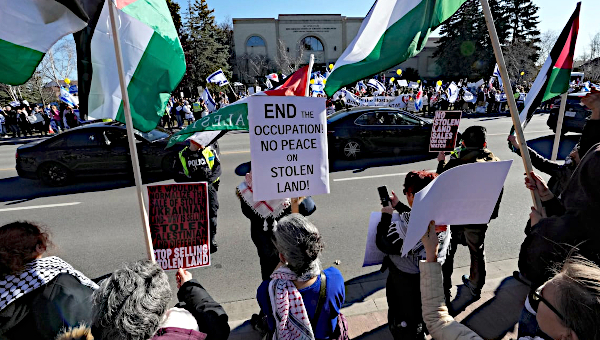Growing Concerns, Coming Battles
Canada’s Immigration and Refugee Policies
The Canadian government has recently been signalling that it is going to introduce changes to Canada’s refugee determination system. For some time the Conservative government of Stephen Harper, and in particular Minister of Citizenship and Immigration Jason Kenney – probably the most right-wing member of the Cabinet, has been campaigning about a crisis in Canada’s refugee system. This campaign has gone alongside a wider ‘politicization’ of Canadian citizenship for people of non-European backgrounds by the government, including the scandalous treatment of Canadians in unsupported claims of ‘terrorism,’ leading to torture in third countries, and the detainment and rejection of some non-white Canadians while travelling on their passports. There is a parallel occurring that needs underscoring: ‘fake’ versus ‘real’ Canadians, and ‘fake’ versus ‘real’ refugees.
This attempt to differentiate by ‘demonization’ – something that the government’s neoliberal discourse does to the poor, unions, and others as well – has gone alongside other changes in Canadian immigration policies by the Conservative government. Some of these are: attempts to reduce even further social service commitments to newcomers, especially those who cannot work; the sharp increases in the use of temporary visa workers; the accentuation of the ‘unfree’ status of migrant workers through their temporary status and labour legislation exclusions; the binding of ‘unfree’ migrant workers to jobs – in poultry factories, agricultural crop harvesting and live-in caregiving in particular – that ‘free workers’ with status will not do; and the attempt to resolve localized labour market problems, especially in Western Canada, through the extension of ‘unfree’ contract workers rather than through wage increases and training.
The concerns about future legislation by activist advocacy groups are, therefore, more than legitimate. It is important that the Left both pre-empt and shape the coming battle and debate. To this end, The Bullet here reproduces statements by No One Is Illegal-Toronto and the Canadian Council for Refugees on concerns about Canadian immigration and refugee policies.
The Wrongs of the Immigration System
Statement by No One Is Illegal – Toronto
Some believe that the Canadian immigration system is fair and generous. It isn’t. And Stephen Harper and Jason Kenney are swiftly making it even worse.
They are underhandedly taking apart the so-called ‘objective’ points-based system. They are moving quickly to get rid of its ‘humanitarian’ part, the refugee process. In its place, they are setting up temporary work programs that are designed to push most migrants in to vulnerable, precarious and temporary jobs without access to services or the ability to unionize.

In 2008, for the first time, more people arrived on exploitative temporary work programs than people with some access to permanent residency!
Major changes have been sneaked through a budget bill and other seemingly disconnected regulation announcements. Bill C-50 and Bill C-45 gave powers to immigration minister and officers to arbitrarily decide who can come in to Canada and who cannot. The family reunification program has been modified to actually deter reunification. Visas have been imposed on Czech Romas and Mexicans. Deportations have increased with moratoriums on return lifted for many countries. Only people in 38 professions can now immigrate to Canada – everyone else is banned. A new clause within the Temporary Foreign Worker manual means that migrants are permanently temporary, they can stay indefinitely in Canada without having to leave to renew their work permit but are unable to apply for permanent residency.
Kenney is bent on breaking the already dysfunctional refugee system.
Refugee acceptance rates have dropped each year, halved in the last two decades. Now the Harper government is ‘revising’ this system. For the first time, Canada could fast-track rejections of refugee claimants from ‘safe’ countries. These ‘safe’ countries are mostly those which Canada has trade relations with. The proposed changes follow a months-long, carefully orchestrated xenophobic campaign, led by Kenney.
Even those granted citizenship are seemingly never fully recognized as Canadian. They are excluded and ignored in and by Canada. Maher Arar, Abousfian Abderazik and Suaad Haji Mohamud are three of the many citizens in whose torture and abuse Canada is complicit.
Canada champions itself as a beacon of progressive immigration and settlement policy as it moves toward a temporary immigration system. But, migrants of colour earn 40% less than their white counterparts. In Toronto, the number of immigrants who are poor has grown by 125%, and almost 60% of poor families are from racialized groups. Immigrant neighborhoods are underserved and marginalized. Immigrant families have little access to recognition of credentials or good jobs, or to services such as affordable childcare.
Many immigrants sacrifice themselves and their aspirations for the betterment of their children. But often second and third-generation immigrants remain in exploitative jobs, pushed out of schools and universities, unable to fully access opportunities promised.
Even more than immigrants, temporary migrants like farm workers, live-in caregivers, construction workers, others, face exploitative and precarious work and living conditions. They pay taxes and build communities but are unable to access the most basic services. Migrant workers are not allowed to bring their families.
During the recession, attacks against migrants have greatly increased. In the last year, immigration enforcement has carried out large workplace raids and forcibly deported people. The enforcement arm of immigration targets non-status people that it considers most vulnerable – women at shelters and people at community gardens. These tactics push already vulnerable undocumented people into situations where they face greater risk and exploitation.
The changes to the Canadian immigration system are a violent continuation of exclusion of migrants. The present Canadian immigration system, set up by settlers on colonized land engages with migrants, mostly of colour, only to exploit their labour. As we fight against the recent and coming regressive changes by Harper and his cronies, we must challenge the entire exclusionary basis of the immigration systems themselves.
Join the fightback!
Visit nooneisillegal.org
Sign up at lists.riseup.net/www/subrequest/nooneisillegal for more information.
Find out more yourself!
- About the refugee system:
- About Canadian mining companies and displacement:
- About poverty and racialization:
- About workplace raids:
- About Jason Kenney’s lies:
- About temporary work programs: (2008)
- About changes to temporary work programs:
- About changes to the refugee act:

Canadian Council for Refugees:
Refugees Need Protection, Without Discrimination
The Canadian Council for Refugees today deplored recent comments made by the Minister of Citizenship and Immigration Jason Kenney suggesting that refugee claimants in Canada are “fake” and that “real refugees” are overseas.
“We totally reject the simplistic and wrong-headed notion that “real” refugees are only to be found overseas,” said Elizabeth McWeeny, President of the Canadian Council for Refugees (CCR). “Whether they are in Canada or overseas, refugees have the same right to and need of protection. At our recent meeting, CCR members expressed their profound dismay both at the derogatory language used by the Minister in talking about claimants and at his suggestion that claimants can be traded off for refugees overseas.”
Under the UN Convention relating to the Status of Refugees, Canada has legal obligations toward people in Canada who claim our protection. 2009 is the 40th anniversary of Canada’s signature of this fundamental instrument of refugee protection.
“Our Diocese funds an office for Ministry to Refugee Claimants,” said Bishop Ronald P. Fabbro, Bishop of the Roman Catholic Diocese of London. “I have met refugee claimants and through our diocesan office can attest to their urgent need for protection from Canada. As the 2006 Pastoral Letter of the Canadian Conference of Catholic Bishops said: ‘Based on the principle of the fundamental dignity of each human person and the consistent ethic of life, the Catholic Church is uncompromising on the rights of refugees… The Church teaches that every country is to see that the rights of refugees are assured and respected as much as the rights of its own citizens.’ ”
The Minister’s comments were quoted in an article in Embassy Magazine, “Resources better spent on UN-approved refugees: Kenney,” published September 9, 2009, suggesting that refugees who claim protection in Canada are less worthy of protection than those overseas.
The Minister’s preference for processing refugees overseas completely ignores the serious problems in Canada’s overseas refugee system. Processing of refugee applications takes years and there is a backlog of 30,000. In public discussion of refugee reform over the past few months, many have called the inland system “broken”, but have neglected the failings of the overseas system: a case apparently of “out of sight, out of mind”.
“Many refugees overseas have no access to the UN and their situation is too dangerous to wait for a solution to come to them,” said Adeena Niazi, Executive Director of the Afghan Women’s Organization in Toronto. “For some, the most effective way to save their lives is to get to Canada and make a claim. We must not discriminate against refugees depending on whether they are here or overseas.”
“We belittle our status as a leading nation in refugee protection, when our government carelessly pits ‘fake’ claimants here against ‘real victims of persecution’ abroad,” said Ed Wiebe, refugee coordinator for Mennonite Central Committee Canada. “As an organization that has worked with thousands of refugees – those overseas in need of resettlement and claimants in Canada – we know things aren’t as simple as the Minister implies. We risk turning away deserving refugees when we start to differentiate based on where they come from, and where they manage to get our attention.”
The CCR strongly condemns the labelling of claimants as “fake.” 42% of refugee claims in Canada are accepted. Of those that are not, some are refugees who were wrongly refused and would be recognized as refugees if the government implemented the right of appeal that exists in the law. Others do not meet the narrow refugee definition but have fled a situation of discrimination or generalized risk. CCR members report that the Minister’s rhetoric about “fake claimants” is not only creating a negative environment for refugees in Canada, but is leading to claimants being denied access to necessary services, based on prejudices about claimants being “bogus.”
The CCR has for decades been calling for changes to the in-Canada refugee determination system, notably to ensure highly qualified decision-makers and that errors can be corrected. The CCR has also repeatedly recommended to the government measures to discourage people who don’t need Canada’s protection from making claims. Unfortunately, Minister Kenney has not consulted the CCR.
The CCR believes that most Canadians are concerned for refugees in need of protection, whether they are here or overseas, and want Canada to live up to its legal and moral obligations toward refugees.
Contacts:
- Janet Dench, CCR Executive Director, 514-277-7223, ext. 2
- Gilbert Iyamuremye, Roman Catholic Diocese of London, Refugee Ministry Specialist for Private Sponsorship of Refugees, 519-256-0506
- Adeena Niazi, Executive Director, Afghan Women’s Organization, 416-588-3585, ext. 222
- Ed Wiebe, National Refugee Program Co-ordinator, MCC Canada, 204-261-6381, ext 227





